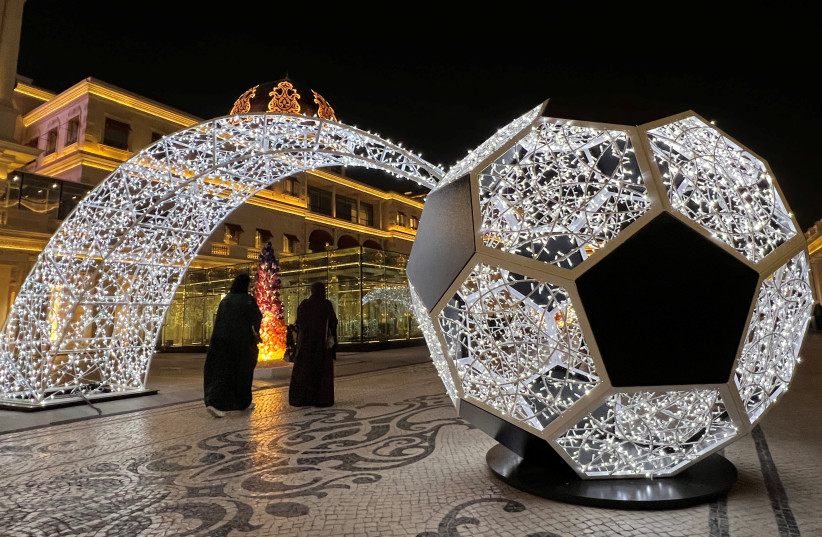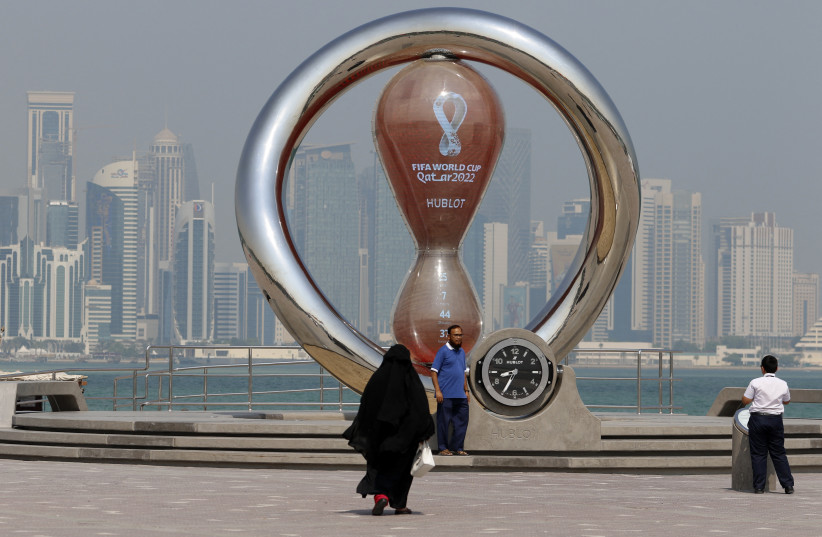International sports have not been about fun and games for many years. Despite the kick that millions get out of the World Cup, starting November 20, it’s hard not to be cynical about the big-business tournament.
I don’t want to ruin anyone’s party, particularly when it’s a global one, but by now it’s well known that the process of choosing Qatar to host the games was faulty at best and more likely, downright corrupt. The term kickbacks comes to mind under the circumstances.
It’s also no secret that some 6,500 foreign workers lost their lives building the impressive stadiums in what has been described as conditions of modern slavery in the often merciless heat. Indeed, the desert venue is so inhospitable that FIFA had to change the dates of the event from the traditional summertime to the cooler days of November-December. Qatar evidently plays by its own rules.
Letting Qatar boost its international standing by hosting the prestigious quadrennial tournament resembles the way the world raced to Beijing for the Olympic Games – twice – despite China’s abominable human rights record and threats to Taiwan and the region. And let’s not forget that the last host of the World Cup was Russia. Today, it’s playing a very dirty game in Ukraine.
In January, US President Joe Biden welcomed Qatar’s leader, Emir Sheikh Tamim Bin Hamad Al Thani, to the White House and two months later Qatar was officially designated “a major non-NATO ally.” Mind you, with all that’s going on in Ukraine, it’s not clear what the status of being a NATO ally means.

And following the Afghanistan pullout last year, it’s not clear to what extent any American allies in the Middle East feel they can rely on the US to protect them if push comes to shove (or something more violent) on the playing field.
Biden buddying up with the Qataris is, in that global village-way, related to the Russia-Ukraine conflict which has seriously disrupted gas supplies to Europe.
Qatar is tiny. Of its population of three million, only 330,000 are citizens. (Compare that to the 1.2 million spectators expected to fly in for the World Cup.) What it lacks in human resources, it makes up for with a valuable natural resource. As the world’s biggest exporter of liquefied natural gas, the crisis in Europe has enabled Qatar to move to the midfield.
The mind-boggling wealth of Qatar has bought it friends, or at least influence.
It is playing a double game, however. It supports and arbitrates with terrorists. Beneficiaries have included the Taliban and Hamas-controlled Gaza. And it’s worthwhile keeping your eye on the ball when it comes to Qatar’s relationship with nuclearizing Iran.
Qatari investments
Qatar’s investments can be found in places as diverse the French soccer field – e.g. megastar Lionel Messi’s contract with Paris Saint-Germain – the German car industry, Italian fashion, and property in Manhattan and several significant London landmarks.
The kingdom also invests in universities and various banking and financial interests worldwide. Its creation and running of the Aspire sports academy has also drawn attention, especially in the World Cup hype.
QATARI STATE-SPONSORED Al Jazeera television is another means of buying power and influence. That’s the name of the game for the Qataris.
Al Jazeera was headline news in Israel this week for all the wrong reasons. There were reports that the FBI will open an investigation into the death of American-Palestinian Al Jazeera journalist Shireen Abu Akleh, who was shot as she covered a clash between armed Palestinians and IDF forces in Jenin in May during Israel’s crackdown on a wave of terrorism.
Israel conducted several thorough investigations into the circumstances of her death, some together with the US, and concluded in September that she was most likely killed by “unintentional fire” from the rifle of an IDF soldier.
Abu Akleh’s death drew a disproportionate amount of attention compared to the deaths of other journalists and media workers – 62 this year alone, according to the Committee to Protect Journalists. You might not have heard of other tragic examples of so-called “collateral” deaths.
According to a US Department of Defense report approximately 12 civilians were killed last year as a result of US military operations. In the blame game, if you can’t point the finger at Israel, the victims don’t seem to count for much.
The US under Biden has been very busy lately telling Israel what it should and should not do: from ministerial appointments, to international travel arrangements, the maritime deal with Lebanon, and above all, calling for stricter open-fire regulations for soldiers.
The latter is not theoretical protocol for Israelis. Only this week, an 18-year-old Palestinian terrorist killed three Israeli civilians in a combined stabbing and car-ramming spree in Ariel. The security guard at the entrance to the industrial zone where the incident started said he had shot in the air rather than neutralizing the terrorist because he was worried about hitting the nearby Palestinian workers.
It’s the sort of split-second moral dilemma which can mean life or death. The terrorist was eventually shot and killed by two soldiers who realized that the car ramming was an ongoing terror attack and not an accident.

There were Palestinians in Gaza and the West Bank who celebrated the murders of the three Jewish men by distributing candies. As far as they were concerned, their team scored an important goal.
But terrorism is not a game. It’s a form or warfare. When soldiers, police officers and others come under attack, they need to be able to return fire – according to Israel’s own strict and clear open-fire regulations – without worrying about how the FBI, thousands of miles away, is going to see it.
It’s possible that the FBI probe is part of Biden’s game strategy faced with the return of a right-leaning government led by Benjamin Netanyahu. But it is another example of something that leads to a lack of trust among supposed allies and friends.
LAST WEEK, the United Nations had another session of its favorite sport: bashing Israel. A UN Special Committee voted in favor of a Palestinian motion to have the International Court of Justice in The Hague draft an advisory opinion on whether “Israeli occupation of the West Bank and East Jerusalem” constitutes de facto annexation.
“This is another unilateral Palestinian move which undermines the basic principles for resolving the conflict and may harm any possibility for a future process. The Palestinians want to replace negotiations with unilateral steps. They are again using the United Nations to attack Israel.”
Prime Minister Yair Lapid
The UN, where the Palestinians have a built-in majority due to the number of Arab and Muslim states, is a favorite playing field. True to form, the resolution referred to the Temple Mount in Jerusalem, Judaism’s holiest site, only by the Muslim term: al-Haram, al-Sharif (the Noble Sanctuary).
The motion was supported by 98 countries. They included Egypt, Jordan and the UAE – and Ukraine, which is demanding that Israel supply it with weapons systems. Palestinian Foreign Minister Riyad al-Malki called the vote a “diplomatic and legal breakthrough.”
By the way, when it comes to “occupation” it should be noted that the UN does not pay Israel rent and municipal taxes for its palatial property situated, poetically, on the Hill of Evil Counsel in Jerusalem.
Prime Minister Yair Lapid issued a statement saying: “This is another unilateral Palestinian move which undermines the basic principles for resolving the conflict and may harm any possibility for a future process. The Palestinians want to replace negotiations with unilateral steps. They are again using the United Nations to attack Israel.”
Indeed, it seems the Palestinian Authority prefers the ongoing financial support and treatment it gets from the UN with their unique “perpetual refugee” status that can be passed on to future generations. The PA’s winning ways include lawfare combined with fostering terrorism through its “pay-for-slay” policy.
It is more than symbolic that Secretary-General of the Fatah Central Committee, Jibril Rajoub – who spent time in Israeli jails after being convicted of terrorism offenses – heads both the Palestinian Olympic Committee and the Palestinian Football Association.
Rajoub, who considers himself a potential heir to the aging and ailing PA head, Mahmoud Abbas, is anything but a good sport. He uses these positions to further the campaign against the normalization of ties with Israel.
It’s time his game be recognized for what it is: foul play.
liat@jpost.com
